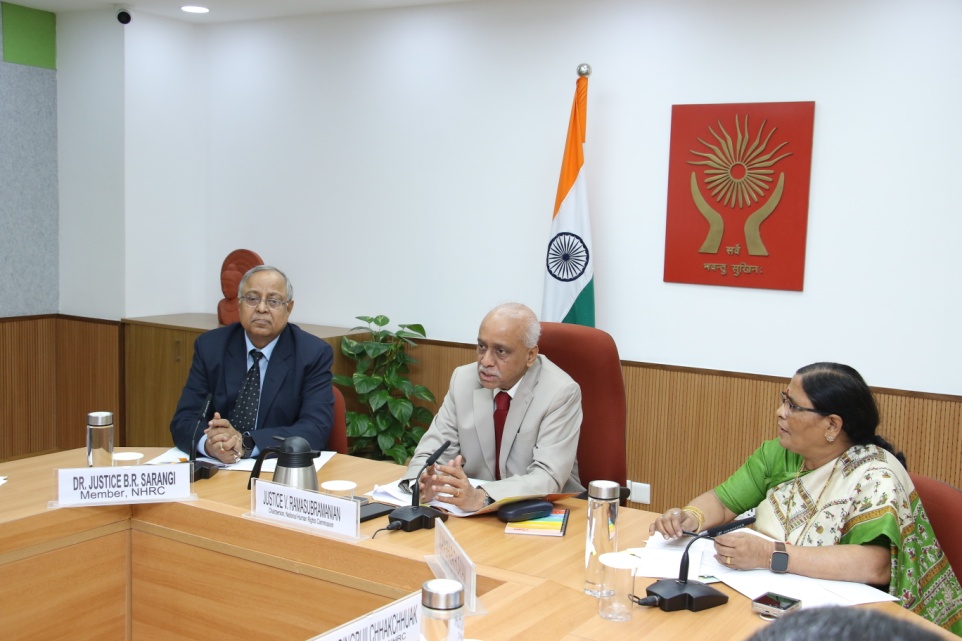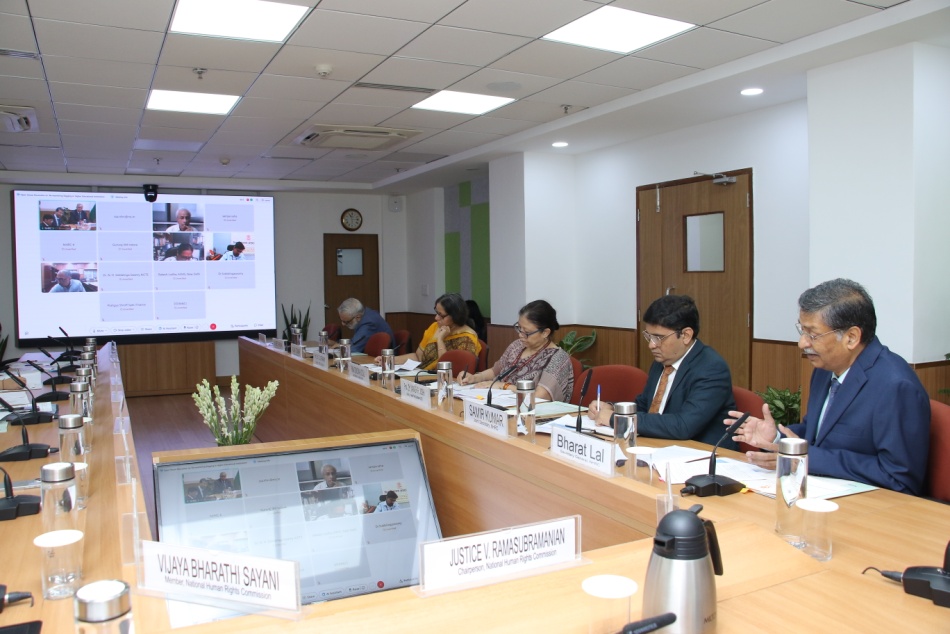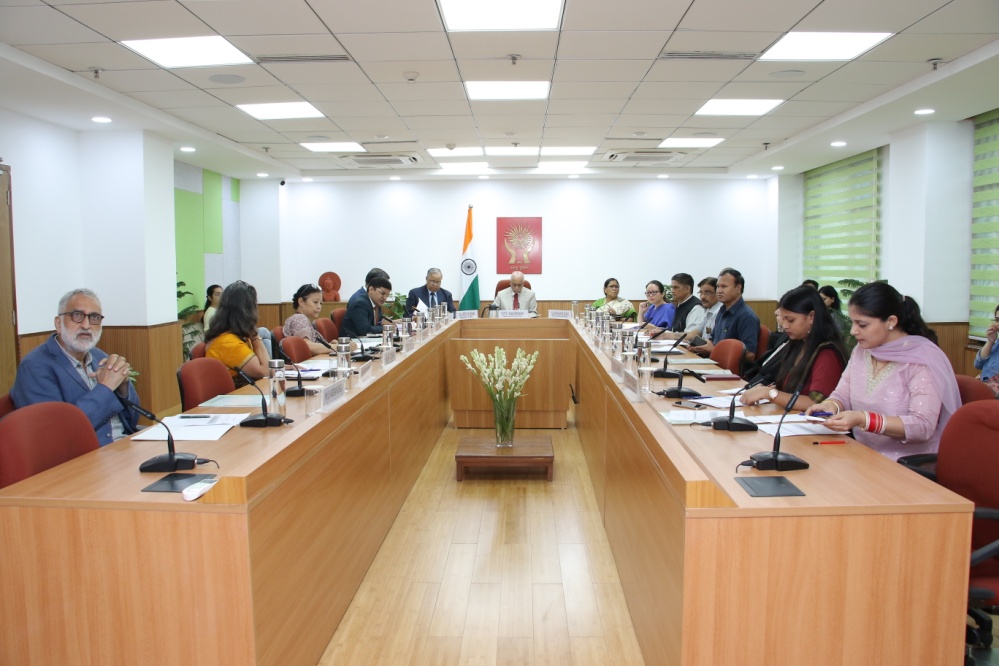NHRC, India organises Open House Discussion on ‘Re-examining Ragging in Higher Educational Institutions: Creating Safer Campuses through Awareness, Accountability and Action’
Press release
National Human Rights Commission
New Delhi: 28th August, 2025
NHRC, India organises Open House Discussion on ‘Re-examining Ragging in Higher Educational Institutions: Creating Safer Campuses through Awareness, Accountability and Action’
Chairperson, Justice Shri V. Ramasubramanian urges improvement in the monitoring mechanism to check ragging in its various manifestations
He says, despite the abundance of laws, statutes, committees and regulations, enforcement remains a major challenge
The National Human Rights Commission (NHRC) convened an Open House Discussion on ‘Re-examining Ragging in Higher Educational Institutions: Creating Safer Campuses through Awareness, Accountability and Action’ at Manav Adhikar Bhawan, New Delhi. The meeting was chaired by Justice Shri V Ramasubramanian, Chairperson, NHRC. It was attended by Members, NHRC, Justice (Dr) Bidyut Ranjan Sarangi and Smt. Vijaya Bharathi Sayani; Shri Bharat Lal, Secretary General; Joint Secretaries, Shri Samir Kumar and Smt. Saidingpuii Chhakchhuak, other officials of the Commission as well as eminent domain experts, heads of higher educational institutions of repute and academic bodies, legal experts and members of civil society, among other stakeholders.
The discussion revolved around three key areas:
i.) Understanding the challenges and impact of ragging in Indian campuses
ii.) Reviewing the existing legal and institutional anti-ragging frameworks and
iii.) Exploring ways to strengthen prevention through awareness, action and inclusion.

Chairing the discussion, Justice Shri V. Ramasubramanian, Chairperson, NHRC, expressed concern over the prevailing practice of ragging in higher educational institutions. Despite the abundance of laws, statutes, committees and regulations, such as the 2001 guidelines, the R. K. Raghavan Committee and the 2009 UGC Regulations, he noted that enforcement remains a major challenge.
He called for stronger monitoring mechanisms to stop ragging in its various manifestations. He emphasised the need to enforce statutes, greater sensitivity in handling complaints and strict anonymity for complainants to ensure victims' protection and justice.
Before this, in his opening remarks, Shri Bharat Lal, Secretary General, NHRC, said that ragging damages self-respect, dignity and in some cases, the whole career of a student. He drew attention to data highlighting medical institutions as hotspots for ragging, accounting for 38.6% of incidents despite having only 1.1% of the total student population in the country. He recalled the constitution of the R. K. Raghavan Committee and reiterated the three fundamental principles of Prevention, Prohibition and Punishment as the framework to combat this menace. Stressing the pivotal role of the NHRC, he urged that the discussion must lead to meaningful outcomes and concrete actions.

Dr. Justice Bidyut Ranjan Sarangi, Member, NHRC, stressed the need to identify the root causes and urged participants to recommend practical preventive measures to control this scourge. Smt. Vijaya Bharath iSayani, Member, NHRC, further highlighted the prevalence of caste-based ragging in certain parts of the country and emphasised the need for inclusive, targeted interventions.
At the outset, while welcoming the participants, Shri Samir Kumar, Joint Secretary, NHRC, outlined the agenda aimed at collectively charting a path forward to ensure that higher education institutions remain spaces of growth, creativity and equal opportunity.
The Open House Discussion was attended by Smt. Rina Sonowal Kouli, Joint Secretary (Higher Education), Ministry of Education; Prof. Manish R. Joshi Secretary, University Grants Commission (UGC); N.H Siddalinga Swamy, AICTE; Prof. Manas K. Mandal, Professor of Psychology, Indian Institute of Technology (IIT) Kharagpur; Shri Bharat Parashar, Member Secretary, National Legal Services Authority (NALSA); Dr.Rakesh Lodha Associate Dean, All India Institute of Medical Sciences (AIIMS), New Delhi; Dr.Gururaj Gopinath Pamidi, Chief Administrative Officer, IIM, Indore; Dr. Arvind Kumar Drave, Consultant, National Medical Commission (NMC), New Delhi; Prof. Sampa Saha, Indian Institute of Technology, Delhi; Prof. Royana Singh, Banaras Hindu University; Prof. Rajendar Kachroo, Founder, Aman Movement; Smt. AlkaTomar, Chairperson, Centre for Youth; Dr. Meet Ghonia, National Secretary, The Federation of Resident Doctors Association (FORDA); Shri Gaurav Singhal, Vice President and Smt. Meera Kaura Patel, Legal head, Society Against Violence in Education (SAVE), among others.

With the active participation of all the stakeholders in the discussions, the following key suggestions emerged:
- The decision architecture needs to be changed by emphasising the ‘nudge technique’ by Richard Thaler to subliminally change people’s mindset for preventing ragging.
- Display of the UGC’s 24x7 anti-ragging helpline on every institution’s website.
- Immediate Mandatory reporting to police.
- Encourage anonymous complaints of ragging.
- Representation of SC/ ST /OBC/ Minorities in anti-ragging committees.
- Ensuring victim safety and protection post-reporting.
- Regular audits, surprise checks, CCTV surveillance and police visits to campuses.
- Establishing Wellness and Inclusion Centres with trained mental health professionals.
- No closure of complaints without the approval of the district administration.
- Annual anti-ragging reports from institutions with evidence and accountability measures.
- Recognition of ragging-free campuses as a best practice.
- Parental involvement in complaint cases.
- Collaboration between NHRC, NALSA and UGC.
***







 राष्ट्रीय मानव अधिकार आयोग, भारत
राष्ट्रीय मानव अधिकार आयोग, भारत

